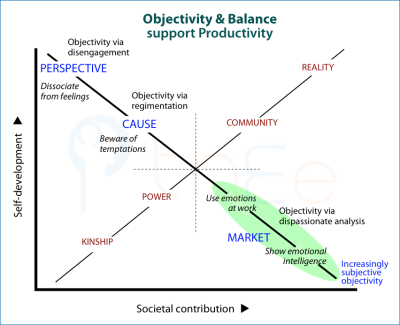Focus: Objectivity & Balance
mentalities must focus on a largely impersonal world, which requires .
Well-being mentalities must be psychologically focused, which requires subjectivity and responsiveness.
These mentalities live in a world of purpose and consequences, and so are preoccupied with
-
&
while releasing passion for the task.
Moving down the diagonal, there is:

-
more engagement with external reality, &
- more beneficial integration of emotions into activities
i.e. .
- centred individuals maintain objectivity by disengaging emotionally from the subject being studied. They accept the messiness of reality and seek win-win-win solutions.
- centred individuals maintain objectivity by accepting regimentation and by following rules principles and procedures developed by the discipline or dogma.
- centred individuals maintain objectivity in their endeavours in a variety of ways e.g. dispassionately weighing costs and benefits, applying quantitative and qualitative analyses, or using independent advisors.
Well-being Set
Those with well-being mentalities are certainly capable of objectivity and balance at work or in specific situations calling for such a focus. However, they do not worry too much about objectivity and balance in regard to what is most important for them: their social relationships.
- Kinship-centred people expect and accept being unbalanced by intense emotions and wishes in relation to family members.
- Power-centred people expect and accept being unbalanced by slights, impulses and fears from within and without their group.
- Community-centred people expect and accept being unbalanced by neglect and mistreatment, blatant unfairness or mindless social damage affecting the members of a community.
- Reality-centred people expect and accept being unbalanced by the slightest event or extraneous stimulus when it gets suddenly filled with intense significance.
Imbalance in any of these naturally generates interaction or talk with relevant people in their group. Their whole approach to effective perception is different.
- See how the well-being set stays focused.
Originally posted: July 2009